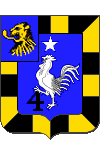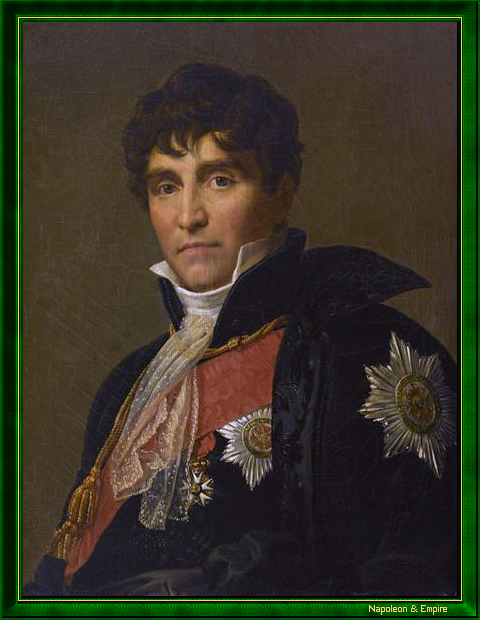Michel Louis Étienne Regnaud de Saint-Jean-d’Angély
Count of the Empire
Pronunciation:

Michel Regnault (also often spelled Regnaud) was born in Saint-Fargeau, in the Orléanais region [now in the Yonne department], on November 3, 1760 (according to the National Assembly database, 1762 according to the Napoleon dictionary). His father was a lawyer. His godparents belonged to the Le Peletier of Saint-Fargeau family, a prominent dynasty of the legal nobility. In his early years, their godson shared a tutor with their children. Later, he left his hometown with his parents to live in Saintonge, in Saint-Jean-d'Angély, his mother's ancestral home.
In 1771, Regnaud enrolled at the Collège du Plessis-Sorbonne in Paris, but he had to interrupt his studies when his father's illness forced him to take on the responsibility of supporting his family. He settled in Rochefort as a lieutenant in the naval provost's office. This position allowed him to support his family. Regnaud nevertheless continued his studies, periodically traveling to Paris to study law with the aim of becoming a lawyer. After passing his exams, he established his practice in Rochefort in 1784. His particular attention to the underprivileged ensured its success.
Upon his father's death, Regnaud returned to live in Saint-Jean-d'Angély. He spent the final years of the Ancien Régime there. In 1789, the town's seneschal's court entrusted him, along with others, with drafting the grievance lists of the Third Estate. On March 16, he was elected to the Estates-General with 176 votes out of 301 cast. A reformer but a moderate, Regnaud was among the supporters of a constitutional monarchy, known as the Monarchiens. It was then that he added his city's name to his own to distinguish himself from others with the same name.
The Journal de Versailles, which he founded in 1789, allowed Regnaud de Saint-Jean-d'Angély to disseminate his opinions. A liberal, a friend of Madame de Staël, and committed to the new ideas, he initially frequented the Jacobin Club. This club welcomed figures as diverse as Maximilien Robespierre, Antoine Barnave, the brothers Charles and Alexandre de Lameth, and Honoré-Gabriel Riqueti de Mirabeau, whose eloquence dominated the debates during the first two years. In May 1791, Regnaud persuaded the Assembly to vote for the transfer of Voltaire's ashes to the Panthéon. On June 20 and 21, the flight of Louis XVI and his subsequent arrest in Varennes caused a split within the revolutionary camp. The Jacobin Club divided. The radicals retained control. Regnaud, along with the moderate majority, joined the Feuillants club. Its members remained steadfastly loyal to the institutions established by the Constituent Assembly. They continued to support the Constitution and the preservation of the monarchy. Throughout this period, Regnaud continued to contribute to several newspapers, always of moderate opinion: André Chénier's Journal de Paris and L’Ami des patriotes, which he co-edited with Adrien Cyprien Duquesnoy.
When the Constituent Assembly dissolved to make way for the Legislative Assembly, Regnaud resumed his legal practice and secretly entered the service of the court. The fall of the monarchy on August 10, 1792, forced him into hiding for several weeks, as his name was placed on a proscription list. He emerged from hiding in October but returned to it in early 1793, after the king's trial, during which he attempted to influence the votes of the deputies. The Army of the North served as his refuge, under an assumed identity. But he was recognized there, arrested in Douai, and imprisoned. Transferred to Paris, he managed to escape and disappeared again with the help of friends who supplied him in his hiding place on the Rue du Bac, until 9 Thermidor, which saw the fall of Robespierre.
After this date, Regnaud moved in with the parents of a young actress, Marie-Louise Chenié, who gave birth to his son on July 30, 1794. The marriage of the two young people, though arranged, could not take place because Marie-Louise died just a few days after giving birth. Little Auguste was recognized by his father and then adopted by his father's wife. Indeed, about a year after the child's birth, Regnaud married Laure Guesnon de Bonneuil.
In 1796, Regnaud became administrator of the hospitals for the Army of Italy. In this position, he first came into contact with NGeneral Bonaparte. Regnaud's career would henceforth be closely linked to that of Napoleon, who found in him a valuable collaborator, both extremely intelligent, a hard worker, and an excellent orator. At the time, they collaborated on the newspaper La France vue de l’armée d’Italie (France as Seen from the Army of Italy).
During the Egyptian expedition, Regnaud, ill, did not go beyond Malta, where he remained as a commissioner of the Directory from June 13 to November 9, 1798. He returned to France to request aid just as the British blockade of the island was being established.
A year later, Regnault participated in the coup d'état of 18 Brumaire, Year VIII, and became a member of the Council of State (4 Nivôse / December 25, 1799). Three years later, after having carried out several important missions, he became president of the Interior section (27 Fructidor, Year X / September 14, 1802). His prestige and influence placed him above all his colleagues, even the most illustrious, as his activity encompassed all specialties, thanks to his recognized erudition and capacity for work. Under the Empire, he would be one of the few to sometimes dare to express an opinion contrary to that of the sovereign.
Napoleon, who held him in high esteem, awarded Regnaud the Legion of Honour on 9 Vendémiaire, Year XII (October 2, 1803), before promoting him to the rank of Grand Officer on 25 Prairial (June 13, 1804). The head of state fully appreciated the skill and persuasive abilities of this valuable collaborator, the eloquence that placed him among the finest orators of the Empire, as well as his writing prowess. He made good use of these qualities by entrusting him with presenting most of the most important texts to the Senate and the Legislative Body. Regnaud thus contributed to the drafting of the Napoleonic Codes, speeches, and imperial correspondence. But he also intervened in the Emperor's private affairs, which led to his playing a role in the divorce from Empress Josephine de Beauharnais. Napoleon continued to use him as a spokesperson before the assemblies, entrusting him in particular with the task of explaining his domestic policy and the troop conscription.
Thus distinguished, Regnaud accumulated prestigious positions and honors, as well as the salaries, bonuses, and endowments that accompanied them: Attorney General at the Imperial High Court (17 Messidor, Year XII / July 5, 1804), Secretary of State to the Imperial Family (1807), Minister of State (1807), Count of the Empire (April 24, 1808), Grand Cross of the Order of the Reunion in 1813. These distinctions flattered a vanity that was not his least flaw. But he also proved to be extremely sensitive and benevolent. His good deeds were numerous. It could be written of him: He never failed to recognize, in their misfortune, those to whom he had shown friendship in their prosperity, and he even repeatedly supported people he disliked who were unjustly oppressed
.
From 1810 to 1815, Regnault de Saint-Jean-d’Angély presided over the commission for the sale of the Description de l’Égypte, a monumental encyclopedic work based on the scientific and iconographic data collected during the Egyptian campaign of 1798–1799.
During the final months of the Empire, he received command of a legion of the National Guard (January 1814). At its head, on March 30, he marched out of Paris to meet the enemy but hastily retreated, giving rise to unfounded accusations of cowardice. He soon left to join Empress Marie-Louise in Blois, where he remained until April 8.
The following year, Napoleon's return brought Regnault back to power. A staunch defender of the Empire, he was elected representative of Charente-Inférieure at the beginning of the Hundred Days and soon regained his title of Minister of State. After the battle of Waterloo, he prevented the Emperor from being deposed a second time by the Assemblies and advised him to abdicate in favor of the King of Rome.
After the final end of the Empire, Regnaud, whose name appears in Article II of the Ordinance of Proscription signed by Louis XVIII on July 24, 1815, preferred to leave France. He departed for the United States (August 28, 1815) where he spent a year, then, returning to Europe, settled in Liège [present-day Belgium]. On March 21, 1816, Regnaud was expelled from the French Academy, to which he had been elected in 1803; he was thus one of the nineteen members expelled from this institution since its creation by Cardinal Richelieu, twelve of them during the Restoration. His efforts to obtain the right to return to his country finally succeeded in 1819, thanks to Élie Decazes, Minister of the Interior in the government of Jean-Joseph Dessolles. Regnaud, ill and exhausted, died in Paris on March 11 of that year, the very night of his return.
He was buried in the Père-Lachaise Cemetery in Paris, in the 11th division .
Le comte Michel Louis Étienne Regnaud de Saint-Jean-d’Angély, d'après François Gérard.

His memoirs, Souvenirs de M. le comte Regnaud de Saint-Jean-d’Angély, published in 1817, are apocryphal.
His wife, Laure de Bonneuil, was strikingly beautiful and held a renowned salon during the Empire, attracting artists and writers. Napoleon disliked her, perhaps because she had rejected his advances. The young woman's rather turbulent love life likely prevented the Emperor from considering this possibility of failure. Nevertheless, Countess Regnaud demonstrated great loyalty to the Empire, even during its most difficult times.
Her son, Auguste Regnaud de Saint-Jean-d'Angély, became a Marshal of France under Napoleon III. This honor recognized his service during the Italian campaign of 1859, particularly at the Battle of Magenta.